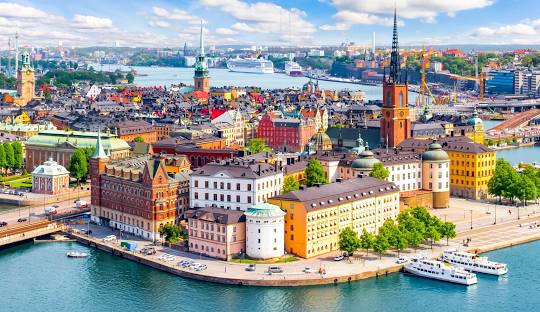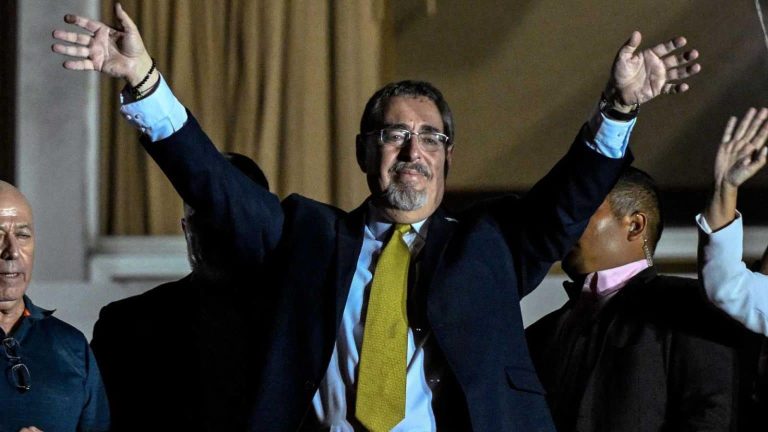20 de diciembre 2023

Former Ambassadors: Sweden Must "Do More" Against Dictatorship in Nicaragua

PUBLICIDAD 1M
PUBLICIDAD 4D
PUBLICIDAD 5D
Edgar Gutierrez: The road is nearly cleared, but this will go on for a long time. As long as Consuelo Porras remains as Attorney General

Bernardo Arevalo, Guatemala’s president-elect / Photo: EFE
The December 14th ruling of Guatemala’s Constitutional Court now smooths the way for President-elect Bernardo Arevalo to be inaugurated on January 14th. However, warns Edgar Gutierrez, Guatemala’s former Minister of Foreign Relations and a current political analyst, the legal decision won’t extinguish the efforts of Guatemala’s “pact of the corrupt” to keep Arevalo from taking office.
The president-elect is backed by a large degree of the citizenry, who are fed up with the corruption that has corroded much of society’s core. He also has sizable support among the international community, which has repeatedly expressed its demand that the popular will of the voters be respected.
The battle will also be fought in Congress, where Arevalo’s Movimiento Semilla party will hold fewer than 15% of the seats. However, there’s also the fact that all the parties in the “pact of the corrupt” – current president Alejandro Giammattei’s Vamos party; the UNE Party of defeated presidential candidate Sandra Torres; and the Cabal Party of Edmond Mulet – are fragmented, something Bernardo Arevalo could use to his advantage, and attempt to build a majority bloc to facilitate his legislative agenda.
In an interview with the online television news program Esta Semana and the Confidencial news site, Gutierrez predicted, “the persecution will continue,” as long as Consuelo Porras remains at the head of the Attorney General’s Office. Nonetheless, he added, “Bernardo Arevalo has sufficient arguments to demand the resignation of Consuelo Porras as of January 14, if current President Giammattei doesn’t do so earlier.”
On Thursday, December 14th Guatemala’s Constitutional Court granted a definitive injunction against the Attorney General’s Office, ordering the presidential inauguration of Bernardo Arevalo on January 14th. Does this mean that the Attorney General’s Office can no longer persist in their actions to annul the elections? Is the road now cleared for President Bernado Arevalo?
I’d say almost cleared. That is, Perhaps what the Attorney General’s Office has going against it most is time, because forming a case and later stripping Bernardo Arevalo of his immunity in 30 days is nearly a material impossibility. They’d have to call a plenary session of Congress, which is about to go on recess, and then obtain a two-thirds vote, which is the qualified majority. Hence, the Constitutional Court has cleared the road for all the other authorities, but the legal cases against Bernardo Arevalo and his Semilla Party are going to continue in accordance with the court resolution itself.
The ruling also orders Congress and the current President Giammattei to submit to the electoral mandate and contribute to this transition process. What should President Giammattei do?
What President Giammattei should do is to call for the resignation of Attorney General Consuelo Porras, because she’s the one who’s impeding an orderly transition and the taking office of a democratically elected new government. If he wants to comply with the Court order to a T, he needs to get Consuelo Porras out of this, because she and her inner circle are basically the ones who are torpedoing the process of democratic transition.
The ruling of the Constitutional Court doesn’t impede the right to investigate. It even speaks of the Attorney General’s criminal persecution. Does this mean that the persecution will continue as long as Attorney General Consuelo Porras and Prosecutor Rafael Curruchiche are at the head of this institution?
In effect, it will continue while they’re in control of the Attorney General’s Office. At this stage, President-elect Bernardo Arevalo has more than enough arguments to demand Consuelo Porras’ resignation on January 14th, if current President Giammattei doesn’t do so beforehand.
What will be the correlation of forces be in Guatemala’s new Congress once Bernardo Arevalo assumes power. His Semilla party will comprise a minority bloc in that Congress, but – how wiil the different forces align after this crisis, which now seems to be resolving in favor of an Arevalo presidency?
Semilla is at a disadvantage, with only 23 deputies out of the 160 seats that make up the Guatemalan legislature. However, there are two windows of opportunity: the first is that the majority of the deputies – over 100 of them – are new. They don’t have any experience in legislative work which allows, as always with rookies, an opening that can be taken advantage of to negotiate. The second and perhaps more important window is that all the blocs within the pact of the corrupt – understood as Giammattei’s Vamos Party: Sandra Torres’ UNE Party, and Edmond Mulet’s Cabal Party – are fragmented.
Current President Alejandro Giammattei’s party has four internal currents. Torres’ party has three, and Mulet’s party is divided in two. These fragmentations can be taken advantage of with a solid political maneuver on the part of the new government to begin building some majority blocs that could facilitate Bernardo Arevalo’s legislative agenda to address key topics for the nation.
President Bernardo Arevalo has had solid international backing from the United States, the Organization of American States, the European Union and among several Latin American leaders, who have all demanded respect for the popular will and a transition that allows him to assume the Presidency. How much support does he have in Guatemalan society, to advance the agenda for changes that got him elected? What’s the position of Guatemala’s private sector?
President Arevalo enjoys great sympathy at a national level. We’ve seen how the population has mobilized during the last two and a half months, especially the indigenous peoples, all over the country.Yes, there’s also solid backing from Guatemalan society, although there’s been a certain degree of fatigue among some urban groups (conservative people) who aren’t very sympathetic to the mobilizations, work stoppages, and the rest. Even so, they don’t question the legitimacy of the new government.
With the large business owners, Arevalo is going to need a careful political operation, because it would be a mistake to view these large businesspeople as a solid bloc. There are many shades, and also some contradictory dynamics within the private sector.
At this stage, they’ve already identified these factors, and in fact have managed to forge an agreement regarding the defense of democracy that was signed by a number of the business chambers and the indigenous peoples’ ancestral authorities, something that’s never before happened in the country. However, that hard core persists, and they haven’t changed their plans to implement a coup d’etat. This group is already under US sanctions.
A few days ago, the government of Joe Biden announced the cancellation of the visas of certain functionaries: a hundred deputies, and it’s said that it also affected 35 large company owners and their families as well. This quantity of individual sanctions had never taken place until now. There aren’t any precedents, not in Guatemala nor in any other country, I believe, except, when there are wars or emergency situations.
This accompaniment safeguards the process of changing leadership on January 14, and gives it political capital that no previous Guatemalan president has had when assuming power. Of course, no other president during our democratic period has ever been so obstinately attacked and sabotaged before reaching power. But yes, there are some pieces in play that favor the next government.
After January 14, Arevalo has to govern instead of denouncing the existence of a coup d’etat and the attempt to impede what the voters imposed as their popular will. Does he have the resources in the Guatemalan budget and the national alliances to be able to govern? What will be his principal challenge beginning January 14?
Bernardo Arevalo’s principal challenge will be governability, and this will involve what we talked about: a series of agreements among sectors and territories around an agenda that reflects the vital interests of different sectors of society.
On the other hand, while it’s true that the budget holds sufficient amounts of money, this money comes with strings attached. The outgoing Congress deliberately approved a budget with many padlocks that are going to make public investment difficult. The part that has to do with government functioning is guaranteed. The Attorney General’s Office, for example, was rewarded with an additional budget, as were the Courts.
So, in a very delicate dance in Congress, Bernardo Arevalo will have to fight for a reform, to get two or three padlocks removed in order to allow him to show results beginning the first year, especially in the recovery of the essential services of health, education and highway infrastructure. If he doesn’t succeed in doing this, he’ll be facing the population’s first signs of disquiet.
Can it be said that the Coup d’etat has been defeated, or is this just one round in a longer fight?
This is going to stretch out. I maintain the hypothesis that the coup is no longer viable, If a coup d’etat were to take place tomorrow in Guatemala, that coup wouldn’t be sustainable. We’d be in a scenario very similar to what then-president Jorge Serrano walked into, when – in the style of [former Peruvian president] Fujimori – he closed Congress and the Courts and declared himself president with absolute powers. But, with a significant part of the business community, civil society and the international community against him, his coup lasted only 72 hours. It was reverted by the Constitutional Court itself.
In the case of Guatemala in 2023 and 2024, the international community has demonstrated that they don’t only threaten, but they follow through on those threats. They’ve already warned that they’re willing to go from individual sanctions on to trade and financial sanctions, and this is no joke for a country that’s so dependent commercially and economically on the western powers. Unlike Venezuela and Nicaragua, the Guatemalan regime doesn’t have any friends outside of the US, Latin America, and Western Europe.
In reality, we’re not looking at a traditional coup in which the army is going to depose the president, but, as historian Rafael Rojas says, a struggle so he either “doesn’t govern or governs with his hands tied.” In other words, the option to wear him out while he governs.
That’s going to be the strategy. Their greatest wish was that he not get there, but that’s looking like a very uphill battle. Their “Plan B” will be to scatter banana peels all along his road so he’s permanently slipping or sinking, But here another type of factor enters in play, one of a political character They’ll be putting to the test the political operating capacity of the new government and the sustainability of citizen support and that of the international community.
PUBLICIDAD 3M
Confidencial es un diario digital nicaragüense, de formato multimedia, fundado por Carlos F. Chamorro en junio de 1996. Inició como un semanario impreso y hoy es un medio de referencia regional con información, análisis, entrevistas, perfiles, reportajes e investigaciones sobre Nicaragua, informando desde el exilio por la persecución política de la dictadura de Daniel Ortega y Rosario Murillo.
PUBLICIDAD 3D